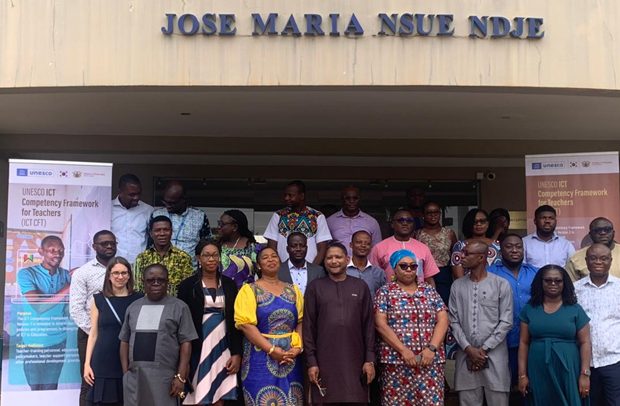UNESCO rep to Ghana, Abdourahamane Diallo (middle) with participants
The United Nations Educational, Scientific and Cultural Organisation (UNESCO), through the Korea Funds-in-Trust project in collaboration with the Ministry of Education (MOE) have began a process to develop an ICT Competency Framework for Teachers (CFT) at primary and secondary school levels to equip them with digital skills in line with international best practices.
Briefing the media during the workshop in Accra, a representative of UNESCO to Ghana, Abdourahamane Diallo, said the exercise is expected to set the standard for the development of essential competencies and ICT skills that Ghanaian educators at the primary and secondary levels should possess.
He said “as we all know, ICT has become an integral part of our daily lives, and its impact on education cannot be overstated. The importance of the ICT Competency Framework for Teachers (CFT) in Ghana is an important initiative that seeks to address a comprehensive framework for developing and assessing the ICT competencies of teachers.”
According to him, with the increasing availability of digital tools and resources, it’s critical that teachers possess the necessary ICT competencies to support effective teaching and learning.
“The framework takes into account the unique context of Ghana and the diverse needs of teachers and aims to provide a roadmap for improving the quality of teaching through ICT integration, how to develop content, how to use data and ICT compliant, and developing their lessons with ICT,” he explained.
He also pledged UNESCO’s commitment to build the capacity of teachers in Ghana as far as digitalisation in this era of ICT is concerned.
He further mentioned that the exercise would also be replicated in other parts of the country for the educators to provide basic training for other teachers in ICT, especially online teaching and learning, while helping the Ministry of Education to develop their policy and framework on Open Educational Resources.
Technicians from the Ministry of Education (MOE), National Teaching Council (NTC), National Council for Tertiary Education (NCTE), and National Council for Curriculum and Assessment (NaCCA) among several others were present to assess if the project aligned with Ghana’s educational challenges and global context.
By Nafisatu Abdul Razak


